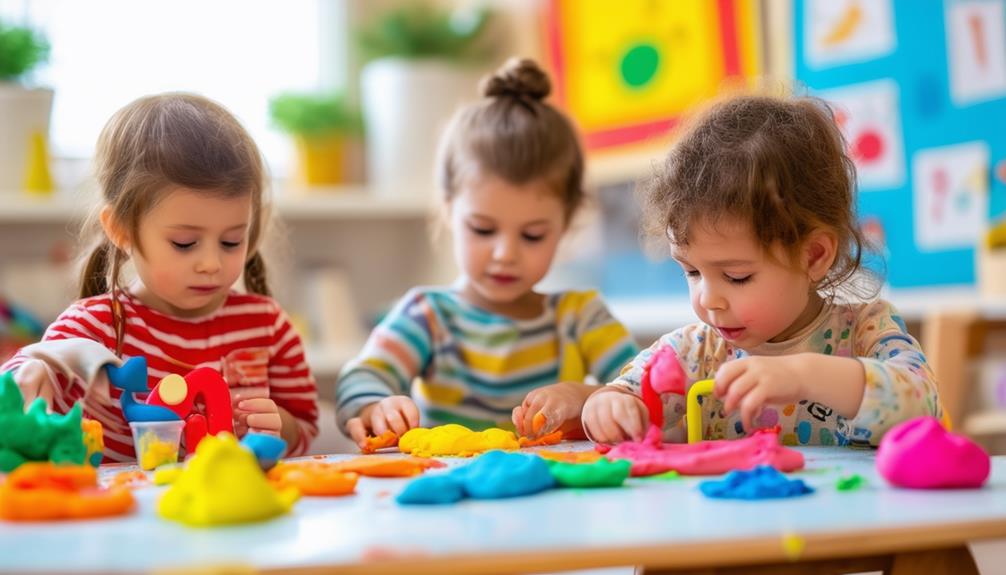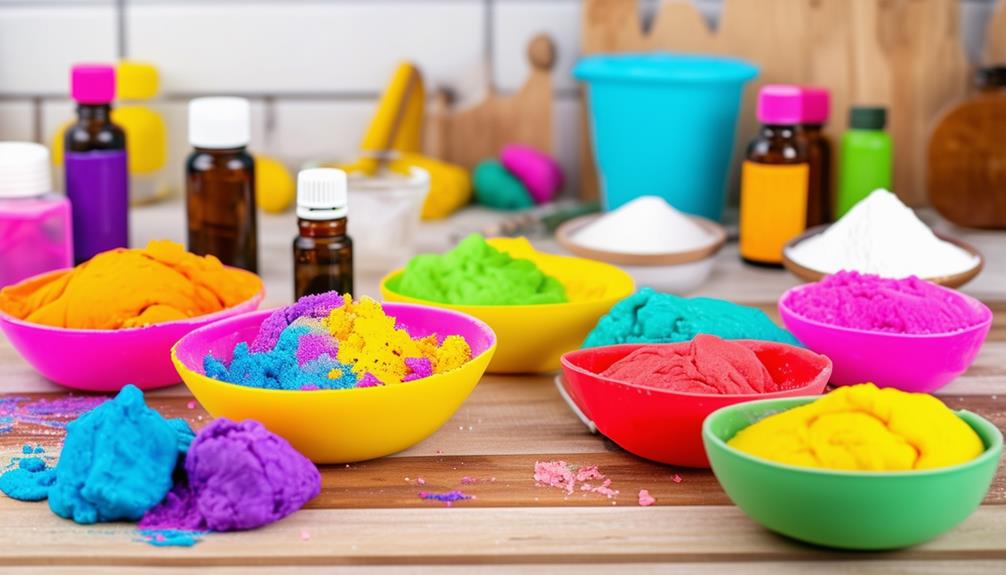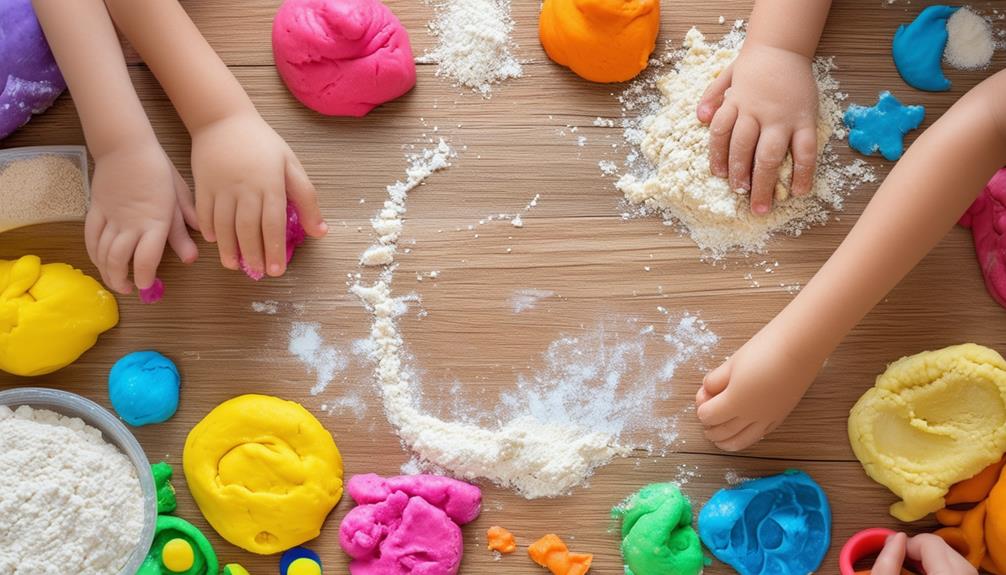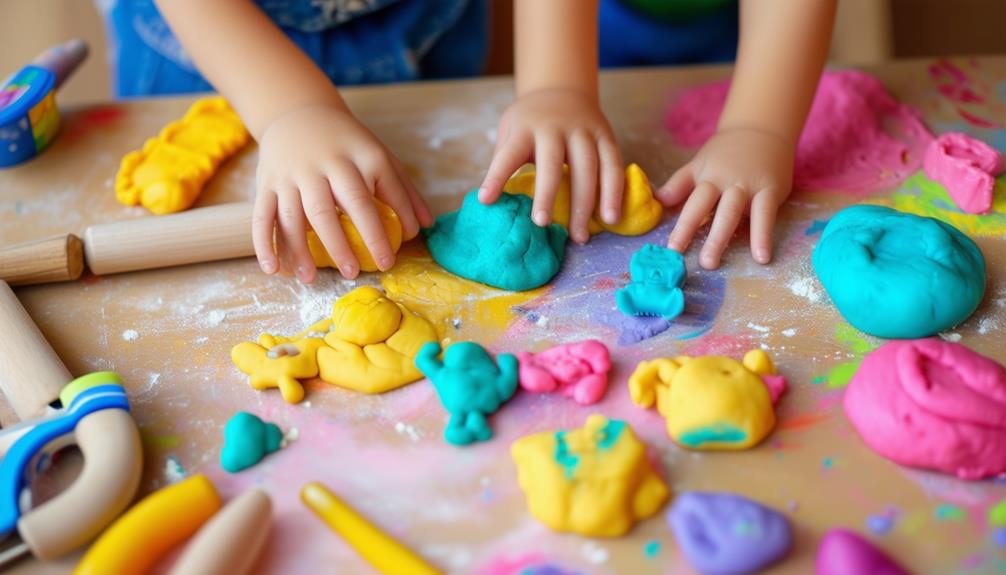The Ultimate Playdough Toolkit: Must-Have Accessories
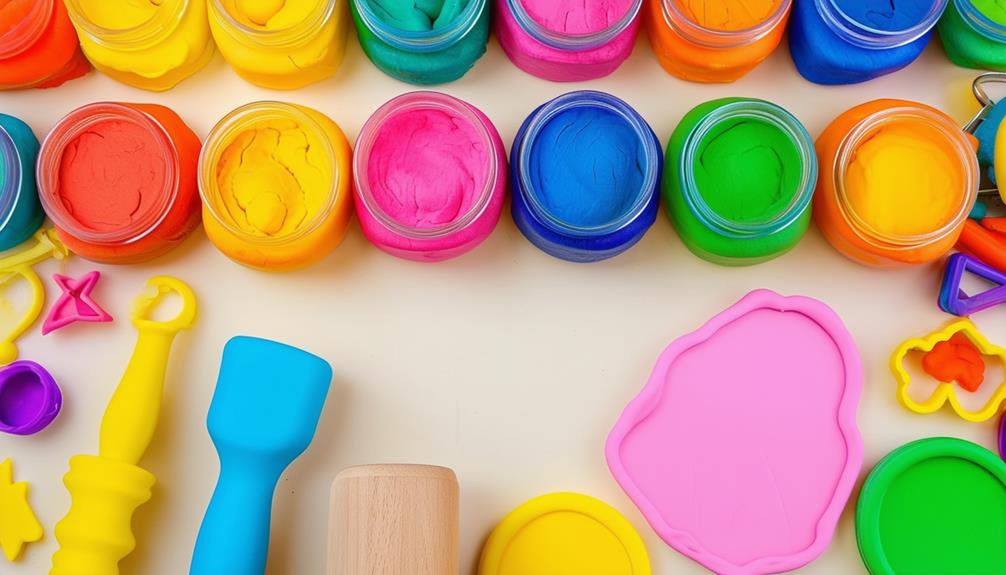
When assembling the ultimate playdough toolkit, it's essential to consider which accessories will enhance the experience. Textured rolling pins can add intricate designs, while silicone cake cases are perfect for shaping imaginative creations. Loose parts can spark limitless creativity, and specialized playdough tools make sculpting a breeze. Each item plays a unique role in making playdough time both enjoyable and educational. But what truly sets this toolkit apart? Let's explore the must-have items and their surprising benefits that can transform playdough sessions into rich learning experiences.
Textured Rolling Pins
Textured rolling pins, with their various patterns, elevate ordinary playdough sessions into engaging, sensory-rich activities. These essential playdough tools are specifically designed for children, making them the perfect size for small hands to grasp and use effectively. Their user-friendly design allows kids to independently explore and create, boosting their confidence and involvement during playtime.
Typically, a set includes one plain rolling pin and three textured ones, providing a range of patterns for endless creative possibilities. Children can press and roll these pins into playdough to craft intricate designs and textures, keeping them entertained for extended periods. Through experimenting with different patterns and shapes, they not only have fun but also develop crucial fine motor skills and hand-eye coordination.
Textured rolling pins are especially beneficial for sensory play. The tactile feel of the wooden tools and the feedback from the playdough stimulate children's senses, making playtime both educational and enjoyable. By adding these textured rolling pins to your child's playdough toolkit, you promote imaginative play and offer an excellent opportunity for them to explore their creativity and dexterity.
Silicone Cake Cases
Adding silicone cake cases to your playdough toolkit enhances your child's creativity with colorful and imaginative role play. These versatile cases are perfect for crafting pretend birthday cakes or any other playdough desserts. They inspire endless fun, transforming simple play into detailed and vibrant creations.
Imaginative Role Play
Imagine the joy on your child's face as they use silicone cake cases to create vibrant playdough cakes for an imaginary birthday party. These colorful cases are perfect for encouraging imaginative play and making playdough time even more exciting. Simple tools like playdough and rolling pins can enhance their experience, helping shape and decorate their creations.
Silicone cake cases are versatile accessories that can spark creativity and allow for endless play possibilities. Here are some ways they can be used in imaginative role play:
- Birthday Parties: Your child can host a pretend birthday party with playdough cakes and decorations, designing unique, eye-catching cakes in different colors.
- Baking Competitions: Set up a friendly baking competition where kids can showcase their culinary skills using playdough and silicone cases, mimicking their favorite cooking shows.
- Tea Parties: Elevate tea party scenarios with an array of small, colorful cakes made from playdough, adding a touch of elegance and fun.
- Bakery Setup: Create a mini bakery where they can 'sell' their playdough cakes, encouraging social interaction and an entrepreneurial spirit.
These silicone cake cases add a new dimension to playtime, making every moment more engaging and educational.
Colorful Creativity Boost
Enhance your child's playtime with vibrant silicone cake cases that effortlessly boost creativity and imagination. These simple yet effective playdough accessories come in a rainbow set, making them ideal for imaginative play. Picture your child decorating playdough cakes, each one a masterpiece of colorful creativity. Whether for a pretend birthday party or a fun afternoon activity, these silicone cases bring a burst of color and ingenuity to any play session.
Adding detail and design to playdough creations has never been easier. Your child can mold, shape, and decorate their playdough cakes with intricate patterns, thanks to these versatile silicone cake cases. They aren't limited to cakes either; they can be used in various play scenarios, sparking endless creative possibilities. Perhaps today it's a bakery, and tomorrow it's a grand feast. The vibrant colors of the silicone cases make each creation come to life, enriching the overall play experience.
Incorporating these silicone cake cases into your playdough toolkit provides a colorful creativity lift, transforming ordinary play into extraordinary imaginative play. So, don't hesitate—add these must-have playdough accessories to your collection and watch your child's imagination soar.
Loose Parts
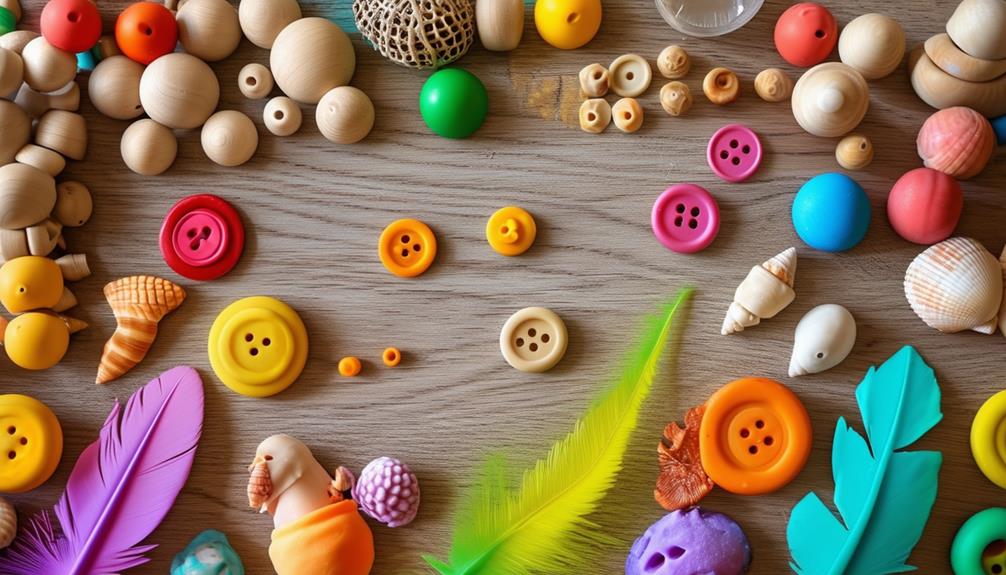
Loose parts like feathers, pasta, and buttons can transform a simple playdough session into an imaginative adventure. These items not only add flair to your creations but are essential for sensory play and developing hand-eye coordination. Incorporating loose parts into your playdough activities can enrich the experience significantly.
Loose parts offer a tactile experience that enhances sensory play. The varied textures and shapes of objects like twigs, shells, and leaves create a rich sensory environment. This keeps kids engaged and aids in developing their fine motor skills. By manipulating these small parts, children improve their hand strength and coordination.
Here's a quick list of loose parts you can easily find and use:
- Natural Items: Twigs, shells, leaves
- Craft Supplies: Feathers, buttons, beads
- Household Items: Pasta, matchsticks, bottle caps
- Outdoor Finds: Stones, acorns, pinecones
These items provide endless opportunities for creativity and imaginative play. They encourage kids to think outside the box and come up with unique designs. Plus, the open-ended nature of loose parts means there are no right or wrong ways to play, fostering a sense of independence and confidence.
Playdough Tools
Using playdough tools is essential for shaping and crafting detailed designs. These tools enhance creativity, motor skills, and hand-eye coordination. From cutters to rolling pins, they offer endless opportunities for imaginative play and learning.
Essential Playdough Accessories
Explore the world of Playdough with essential tools like plastic knives, cookie cutters, and textured rolling pins to boost your child's creativity and fine motor skills. These accessories make Playdough time both engaging and educational by allowing children to explore various shapes, textures, and designs.
Here's a list of must-have Playdough accessories:
- Plastic Knives: Safe and ideal for cutting Playdough into different shapes and sizes, promoting precision and control.
- Cookie Cutters: Available in various shapes and themes, these turn simple Playdough into exciting creations, encouraging imaginative play.
- Textured Rolling Pins: These add unique patterns and textures to Playdough, enhancing sensory experiences and artistic expression.
- Children's Scissors: Perfect for developing scissor skills and adding intricate details to Playdough projects.
Additionally, real kitchen tools, cake decorating tools, and everyday objects like cups and stamps can be used to add creativity. Incorporating elements like glitter, rocks, and shells can introduce new textures and interests, making Playdough creations even more engaging.
Enhancing Motor Skills
Using playdough tools is an excellent way for children to develop hand-eye coordination and dexterity while enjoying themselves. By incorporating a variety of tools like cutters, rollers, and stamps, children can significantly improve their fine motor skills. These tools facilitate activities that require precise movements and control, contributing to sensory development through tactile experiences.
When children use these tools, they are not just playing; they are also honing their hand-eye coordination. Activities such as rolling out playdough with a mini rolling pin, cutting shapes with small cutters, or pressing stamps into the dough require focus and control of hand movements. This practice is vital for developing dexterity, which will benefit them in tasks such as writing or tying shoes.
Here is a quick guide to some essential playdough tools:
| Tool Type | Benefits |
|---|---|
| Cutters | Enhances fine motor skills |
| Rollers | Improves hand-eye coordination |
| Stamps | Stimulates creativity and dexterity |
| Molds | Assists in tactile exploration |
These tools not only make playtime more enjoyable but also transform it into a valuable learning experience. Equip your playdough toolkit with these essential tools to help your child develop important motor skills while they play.
Googly Eyes
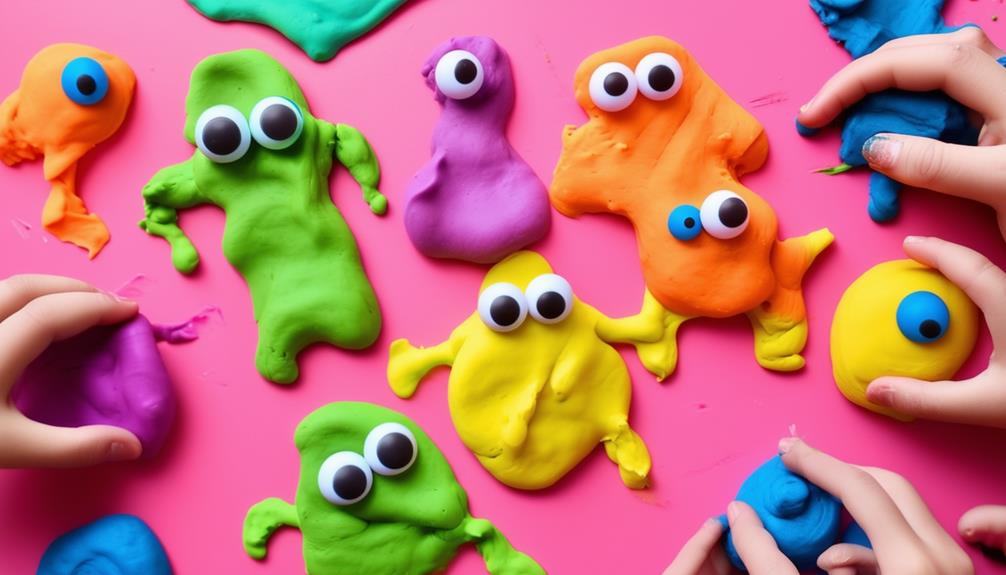
Googly eyes transform your playdough creations into animated characters full of personality. They inject a fun and creative element, making inanimate objects appear lively. Whether you're crafting animals, monsters, or aliens, googly eyes add a spark of imagination to any project. Kids Art Clay is ideal for shaping different figures and attaching these expressive eyes to bring your characters to life.
Here's why googly eyes are an essential accessory in your playdough toolkit:
- Variety in Sizes and Colors: Googly eyes come in numerous sizes and colors, catering to a wide array of projects. Whether you need tiny eyes for a delicate creature or large ones for a bold monster, there's an option for every idea.
- Boosts Storytelling: These quirky eyes are perfect for enhancing storytelling and role-playing scenarios. They inspire kids to create characters with unique personalities, enriching their imaginative play.
- Stimulates Creativity: Adding googly eyes to their creations helps children become more engaged in their projects. It offers an extra layer of fun and creativity that keeps them entertained.
- Easy to Apply: Simply stick them onto your playdough models to instantly transform them. No additional tools or skills are required, making them accessible for children of all ages.
With googly eyes, your playdough creations will come to life like never before!
Alphabet Stamps
Alphabet stamps offer a fun, interactive way for children to practice letter recognition and spelling while playing with playdough. These stamps feature child-friendly fonts and include both lower and upper case letters, along with punctuation marks, making them ideal for educational play. Incorporating alphabet stamps into playtime can significantly enhance your child's early literacy skills in an engaging context.
Using alphabet stamps with playdough fosters creativity and language development. You can create themed activities that make learning letters enjoyable and ignite your child's imagination. For example, encourage your child to stamp out their name, create simple words, or form short sentences. This type of play not only reinforces letter recognition but also introduces them to punctuation and sentence structure.
Additionally, alphabet stamps are excellent for enhancing fine motor skills. Pressing the stamps into the playdough requires precision and control, helping to develop the small muscles in your child's hands and fingers. This practice is crucial for tasks like writing and other activities that require dexterity. Add alphabet stamps to your toolkit and watch your child's literacy and motor skills flourish!
Playdough Extruder
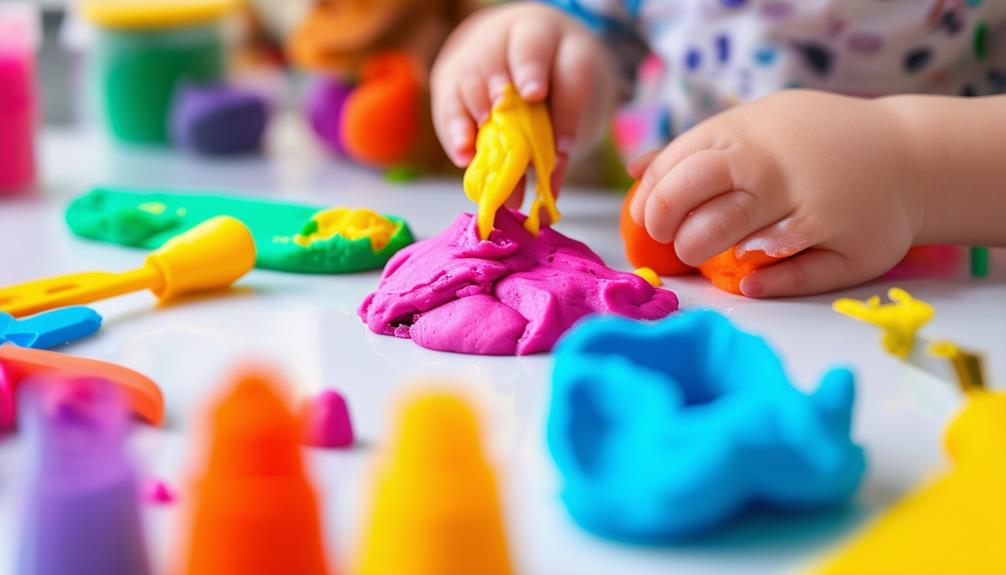
A playdough extruder allows children to create long, colorful strips and various shapes, sparking endless imaginative play. These engaging tools foster creativity and exploration, making them essential in any playdough toolkit. Available in different shapes and sizes, playdough extruders enable children to craft intricate designs effortlessly.
Using playdough extruders helps children:
- Improve Fine Motor Skills: Pushing and pulling the extruder strengthens hand muscles.
- Create Pretend Meals: From spaghetti to French fries, the imaginative possibilities are endless.
- Explore Different Shapes: Unique extruder shapes promote creative thinking.
- Engage in Sensory Play: Handling playdough and extruders provides a fun, educational tactile experience.
Plastic playdough extruders are safe and easy for kids to use, enhancing hands-on learning. They support creative expression and fine motor skill development, making them a valuable addition to playtime. To enrich your child's imaginative play, incorporating various playdough extruders into their toolkit is highly recommended.
Plastic Scissors
After creating intricate designs with playdough extruders, children can further enhance their fine motor skills by using plastic scissors to cut and shape their creations. Plastic scissors are essential tools for developing scissor skills, particularly as they easily cut through the thicker material of playdough. These scissors are designed to be safe for kids, offering a perfect blend of functionality and safety, ensuring your little ones can engage in creative play without risk.
Using plastic scissors, children practice cutting and snipping, which is crucial for fine motor skill development. The repetitive motion of opening and closing the scissors helps strengthen the muscles in their hands and fingers while also improving hand-eye coordination. These skills are foundational for many other activities they'll encounter as they grow, such as writing, drawing, and even tying their shoes.
Plastic scissors are easier for children to handle and manipulate, making them ideal for young learners. Their lightweight design and safe edges make them a staple in both educational settings and at home. Including plastic scissors in your playdough toolkit will engage your child in creative and skill-building play, providing endless opportunities for learning and fun.
Number Stamps

Number stamps are excellent tools for helping children improve their number identification skills while having fun with playdough. These stamps make learning numbers an engaging and hands-on experience. By pressing the stamps into the playdough, kids can visually and tactilely connect numbers to their shapes, reinforcing their comprehension.
Using number stamps also plays a crucial role in 1:1 correspondence counting practice. This means that children can match one object to one number, which is fundamental for developing early math skills. They can stamp out a number and then count out the corresponding number of playdough balls, making abstract concepts more tangible.
Here's why number stamps are vital for your playdough toolkit:
- Number Identification: Kids get to see and feel the numbers, which helps them identify and remember them better.
- 1:1 Correspondence: Stamping numbers and counting playdough pieces help reinforce the concept of one-to-one matching.
- Math Skills Development: Regular use of number stamps encourages early numeracy skills in a fun and interactive way.
- Comprehensive Learning: With child-friendly fonts and included punctuation marks, these stamps provide a thorough tool for early learning.
Incorporate number stamps into your playdough activities, and watch your child's math skills flourish!
Playdough Cutters
Playdough cutters come in various shapes, from farm animals to robots, sparking your child's creativity. These cutters make playtime interactive and are safe and non-toxic, ensuring worry-free fun. Additionally, they help improve fine motor skills and encourage imaginative play.
Diverse Shape Options
Playdough cutters come in a variety of themes such as people, farm animals, robots, and jungle creatures, turning simple play into a creative adventure. Kids love these imaginative shapes that transform their playdough into exciting stories and scenes. These cutters not only spark creativity but also help develop fine motor skills as children press, cut, and mold the dough.
Here are some popular playdough cutter themes you can explore:
- People and Dress-Up: Kids can create characters with different outfits and accessories, enhancing storytelling and role-playing.
- Farm and Jungle Animals: From cows and chickens to lions and elephants, these cutters bring the animal kingdom to life.
- Robots and Dinosaurs: These shapes allow kids to build their own prehistoric creatures or futuristic robots, combining fun with learning.
- Ocean Creatures and Numbers: Dive under the sea with fish and octopuses or learn numbers and counting through play.
With these diverse shape options, children can bring their imaginative worlds to life. Each theme introduces new textures and forms, promoting fine motor skill development while keeping playtime engaging and educational. So, grab a set of cutters and watch your child's creativity soar!
Enhancing Creative Play
With a diverse array of playdough cutter themes available, you can effortlessly enhance creative play and transform each session into a captivating adventure for your child. These cutters come in various shapes, such as people, animals, and robots, which can instantly ignite your child's imagination. Incorporating themed sets like farm, jungle, or dress-up not only boosts creative play but also encourages imaginative storytelling. Your child can concoct entire narratives around their playdough creations, fostering a rich world of exploration and fun.
Using playdough cutters also significantly aids in developing fine motor skills. The act of pressing, cutting, and molding the dough demands precise hand movements, thereby strengthening dexterity and coordination. Popular options like robot and dinosaur cutters can captivate your child's interest, making the learning process enjoyable.
Moreover, educational cutters featuring numbers and alphabets seamlessly blend playtime with early learning. This dual-purpose approach enriches the experience and lays a foundation for essential skills. By integrating these varied cutter themes, you not only provide entertainment but also actively support your child's overall growth and development.
Safe and Non-Toxic
Ensuring playdough cutters are safe and non-toxic is essential for a worry-free playtime experience for your child. When selecting these tools, prioritize materials free from harmful chemicals to protect your child, even if they accidentally put a cutter in their mouth.
Here are key points to consider for safe and non-toxic playdough cutters:
- Material: Choose cutters made from high-quality, food-grade plastic or other safe materials. This ensures they are safe for children to handle and use.
- Certification: Look for products approved by safety organizations, indicating they meet strict safety standards.
- Ease of Cleaning: Ensure the cutters are easy to clean, reducing the risk of bacteria buildup. Regular cleaning keeps them safe for repeated use.
- Durability: Opt for durable cutters that withstand active play. Sturdy tools minimize the risk of breakage, which could lead to sharp edges or small parts that pose choking hazards.

